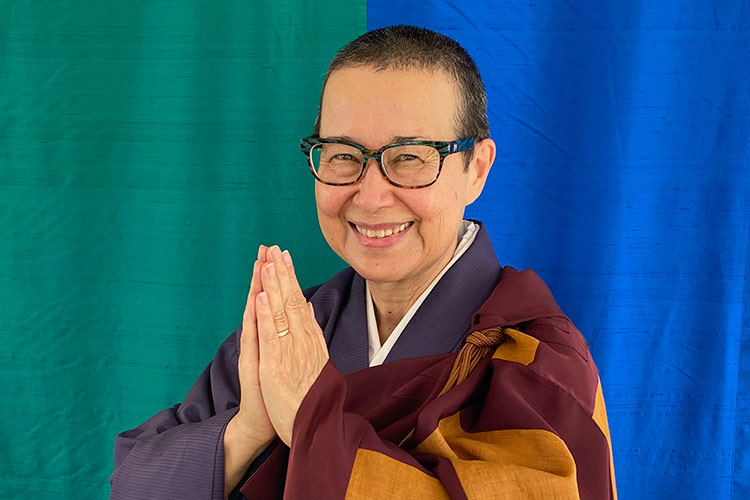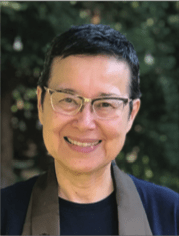
Taking My Place
October 1, 2022
 by Wendy Egyoku Nakao
by Wendy Egyoku Nakao
Heaven is my father and Earth is my mother and even such a small creature as I finds an intimate place in their midst. Therefore that which fills the universe, I regard as my body, and that which directs the universe, I regard as my nature. All people are my brothers and sisters, and all things [in nature] are my companions.
— Zhang Zai’s “The Western Inscription (Ximing)”1
I recite this prayer every day before the light of dawn. Settling into my body, I take my place in the cosmos right where I stand. I affirm my nature and set my direction for the day. Tell me, how do you situate yourself at the start of each day?
The verse is “The Western Inscription (Ximing)” by the Chinese philosopher Zhang Zai (1020-1077). Zai wrote this verse on the western wall of his study, hence the title. It was said to have influenced the neo-Confucian movement and is often criticized by Confucians as being too heavily Buddhist or Taoist. Whatever its provenance, it resonates deeply with me. I have committed it to memory and also enjoy reciting it on my daily walks.
It’s essential to take your place in the world upon arising in the morning, affirm your nature, and set the compass of vow. You are already in the world, and yet, you are not quite in it either. Let’s be all in. Reciting this verse out loud grounds me in my unique, albeit tiny, place in the cosmos. It’s as though the universe welcomes me, and the universe and I seem to agree about my intimate place in its midst. When I affirm that the universe and I are of the same nature, this underlying harmony wakes up within me. I feel my own sufficiency and am prepared to live out the day, whatever it may bring.
Through many years of dawn zazen, I have grown to love this magic hour. Every morning while it is dark, I step onto the deck of our home, open my arms and face the expanse of the Whulge or “Sea” (the Indigenous name for the Puget Sound) and greet the darkness. I call upon the Buddhas, Bodhisattvas, and Ancestors to witness. I call everything out loud by name—the great beings, the dark, the shadows of trees, the sound of lapping waves, and the stars up above. I greet the great Tahoma, the “Giver of Water” (Mount Rainier) to my left, and the Sun-a-do Mountain Range (Olympic Mountains) to my right, not yet revealed by daylight. I greet the wind and the morning chill beneath my feet.
I speak out loud my prayers of gratitude, creating them spontaneously, but being sure to include the four leggeds, the winged ones, those that crawl, and those that live in the sea. I understand more fully now why the Mahayana sutras, intrinsically inclusive and diverse, always mention every form of life. Consider this line from the Diamond Sutra when the Buddha instructs Subhuti, “A Bodhisattva should keep this in mind: All creatures, whether they are born from the womb or hatched from the egg, whether they transform like butterflies or arise miraculously, whether they have a body or are purely spirits, whether they are capable of thought or not capable of thought: All of these I vow to help enter nirvana before I rest there myself!” 2 No thing and no being is excluded from this intimate place. I re-set myself in accord with this fundamental reality at the start of each day.
Zen masters of old have left prayers that aroused their deep faith in life. Zen prayers speak to spiritual aspiration. They harmonize the one praying with the reality that is life. Dogen Zenji appeared to have prayed quite fervently. Yamada Koun Roshi, our Dharma uncle through Yasutani Roshi’s lineage, strongly encouraged his students to pray. He said that “if we truly wish to attain kensho, we must pray that our eyes may be opened.”
Mount Tahoma ( Rainier) at sunrise.
Yamada Roshi encourages stating clearly what it is you want to accomplish in your spiritual practice. Narrow your focus so that you can discern your spiritual aim. Make it clear to yourself. Saying my prayer vows everyday clarifies how I proceed throughout my day. When you say a prayer as though you have faith in it, you open yourself to help from any direction. A monk once asked Dogen Zenji about Zen practice, “Do we rely on ourselves (joriki) or on another power (tariki)?” Dogen Zenji replied, “It is neither ourselves nor another power.” Yamada Roshi comments: “Of course, to his own efforts, he offered up fervent prayers every day.” The more I offer prayers, the deeper it settles in me and clarifies what is most important for my life.
Dawn prayer sets my direction as I take my place in the world for the coming day. After offering gratitude, I recite “The Western Inscription:” Heaven is my father and Earth is my mother, and even such a small creature as I finds an intimate place in their midst. As I recite this, I feel the small creature of myself slip into my intimate place in the cosmos. It’s a posture of humility. It’s a gassho, the placing of right and left palms together to express this fundamental unity of the one body—of me and other, of buddhas and sentient beings, of heart and mind. I take my seat on my zafu, wrap blankets around me, and recite the Gatha of Atonement.
The Gatha of Atonement is a most important prayer. This small creature such as I has a great accummulation of karma which has no doubt caused incalculable harm. Everyday it reveals itself to me in tiny and big ways. Affirming that this was the same for the Ancestors, I am sustained by their efforts in transforming their karmic obstructions. I am also sustained by your efforts. Do not be overwhelmed by your karmic accumulation. Just keep raising the heart-mind of atonement and set your sights on how you can step into your intimate place, just as you are, and fulfill the Bodhisattva vows of awakening. We slip and fall, grovel in the mud, get up and slip again. It is not pretty. Do not be deterred: allow the atonement prayer to settle deep into your heart.
Having recited the preceding prayers, my heart-mind is already harmonizing with the universal life force. Now I do zazen. Zai’s verse continues: Therefore that which fills the universe, I regard as my body, and that which directs the universe,
I regard as my nature. These lines fill me with awe. There is no “out there.” The life force is all-pervading—it is here, there, and everywhere; it is every being—those I love and those I hate; it is everything, the trees and rivers, the creatures great and small, the buzzing mosquito flies straight for my face. Isn’t the life force the very essence of zazen? Zazen is the ultimate at-onement.
At the conclusion of zazen, I chant the Verse of the Robe: Vast is the robe of liberation, A formless field of benefaction, I wear the Tathagata teaching, serving all sentient beings. This powerful prayer says, “Now, go about your day with the Buddhas and bodhisattvas, the Earth and all of its creatures, those needing a helping hand, wrapped around you like clothing.” Leave aside what it all means; simply rejoice in its aliveness. See the dynamic and intimate patterns of life—the blackberries growing on thorny branches attact tiny flies, the gulls call when day breaks, the bare feet of a child stirs the need for shoes within me. The robe of liberation reveals the intimate call and reponse of the life force. Wear it well! Serve well! Offer whatever you can to benefit another’s life; do what you can to save the planet; guard your speech and refrain from going against life.
I go to my home altar and chant the Hannya Shingyo and the ShoSaiMyo Kichijo Dharani. Zai says: All people are my brothers and sisters, and all things [in nature] are my companions. My prayer list is a mishmash of both the living and dead, including a prayer that leaders—even those reaping havoc—lead with wisdom and compassion. Reciting it feeds my spirit. After a few more prayers, I am ready to begin the day.
Please give careful thought to how you begin your day. Ground yourself in a morning ritual for the Fall Practice Period.
Roshi Egyoku is the Senior Dharma teacher at ZCLA.
